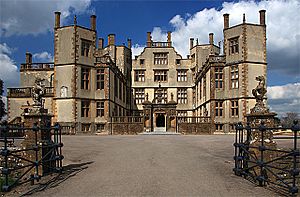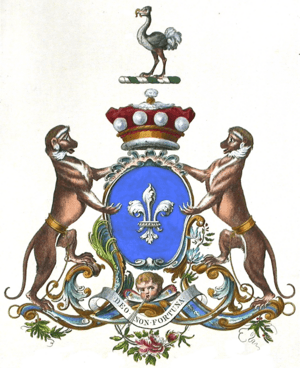Henry Digby, 1st Earl Digby facts for kids
Quick facts for kids
The Earl of Digby
|
|
|---|---|
| Member of Parliament for Wells | |
| In office 1761–1765 Serving with Clement Tudway
|
|
| Preceded by | Charles Tudway Robert Digby |
| Succeeded by | Clement Tudway Peter Taylor |
| Member of Parliament for Ludgershall | |
| In office 1755–1761 Serving with Thomas Hayward
|
|
| Preceded by | Sir John Bland Thomas Hayward |
| Succeeded by | Thomas Whately John Paterson |
| Personal details | |
| Born |
Henry Digby
21 July 1731 |
| Died | 25 September 1793 (aged 62) |
| Spouses |
Elizabeth Feilding
(m. 1763; died 1765)Mary Knowler
(m. 1770) |
| Relations | Edward Digby, 6th Baron Digby (brother) William Digby, 5th Baron Digby (grandfather) Henry Fox, 1st Baron Holland (uncle) Charles James Fox (cousin) |
| Children | 6 |
| Parents | Hon. Edward Digby Charlotte Fox |
| Residence | Sherborne Castle |
Henry Digby, 1st Earl Digby (born July 21, 1731 – died September 25, 1793) was an important British noble and a Member of Parliament. He held several important positions during his life.
Contents
Early Life and Family
Henry Digby was the younger son of Edward Digby and Charlotte Fox. His father, Edward Digby, was also a Member of Parliament (MP) for Warwickshire. Henry's older brother was Edward Digby, who later became the 6th Baron Digby.
Henry had some famous relatives. His uncle was Henry Fox, 1st Baron Holland, a well-known politician. This made Charles James Fox, another very famous politician, his cousin.
Political Career and Titles
Henry Digby started his political career in 1755. He was elected as a Member of Parliament for Ludgershall. An MP is a person elected to represent an area in the House of Commons, which is part of the British Parliament. He held this seat until 1761.
After that, he represented Wells in Parliament from 1761 to 1765. From 1763 to 1765, he also served as a Lord of the Admiralty. This meant he was part of the group that managed the British Navy.
In 1757, Henry's older brother Edward passed away. Henry then became the 7th Baron Digby. This was an Irish peerage, which is a noble title from Ireland. Because it was an Irish title, it did not stop him from being an MP in the British Parliament. This title also gave him ownership of Sherborne Castle, the family's large home.
Joining the House of Lords
In 1765, Henry Digby received a new title. He was made Baron Digby, of Sherborne, in the Peerage of Great Britain. This was a British noble title. This new title meant he had to leave his seat in the House of Commons. Instead, he joined the British House of Lords, which is the upper house of the British Parliament, made up of nobles.
From 1771 to 1793, Lord Digby served as the Lord Lieutenant of Dorset. This was an important role where he represented the King in the county of Dorset.
In 1790, he received even higher honors. He was made Viscount Coleshill and Earl Digby in the Peerage of Great Britain. These were very high noble titles.
Family Life
Lord Digby was married twice. His first marriage was to Elizabeth Feilding on September 5, 1763. They had one son, Edward, who sadly passed away as a baby in the same year he was born. Elizabeth died in 1765.
On November 10, 1770, he married his second wife, Mary Knowler. They had five children together:
- Lady Charlotte Digby (1772–1807)
- Edward Digby, 2nd Earl Digby (1773–1856), who later became the 2nd Earl Digby. He also served as Lord Lieutenant of Dorset.
- Hon. Henry Digby (1774–1776), who died when he was very young.
- Hon. Rev. Robert Digby (1775–1830), who became a church leader.
- Hon. Stephen Digby (1776–1795), who also died young.
Lord Digby passed away in September 1793, at the age of 62. His eldest son, Edward, inherited his titles. His second wife, Countess Digby, died in 1794.
Coat of Arms
 | Claudette Colvin |
 | Myrlie Evers-Williams |
 | Alberta Odell Jones |



